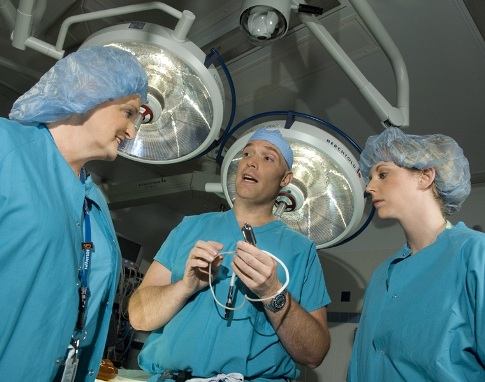Physicians in Health Care Quality
Measuring care and outcomes is the first step toward improving them. Measurement permits physicians to assess their effectiveness and identify opportunities to improve. Similarly, publicly reporting progress and goals is an important first step towards helping patients understand the role they must play in their health. That’s why measurement is just one part of a comprehensive initiative that includes strategies to educate and activate patients so that they become more involved in improving and maintaining their own health. PHCQA is committed to making meaningful, relevant, and unbiased information about health care quality accessible to the public and to supporting efforts to maintain and improve quality.
Leading by Example
One of the ways we aim to exemplify how physicians can take a leadership role in transforming care is by highlighting the efforts and successes of physician practices committed to the patient-centered medical home (PCMH) model. The PCMH is a team-based model of care led by a personal physician who provides continuous and coordinated care throughout a patient’s lifetime to maximize health outcomes. The American Academy of Pediatrics (AAP) introduced the medical home concept in 1967, initially referring to a central location for archiving a child’s medical record. In 2002, the AAP expanded the medical home concept to include these operational characteristics: accessible, continuous, comprehensive, family-centered, coordinated, compassionate, and culturally effective care.
There are many benefits to the PCMH model:
- Physician leadership — A personal physician leads a team at the practice level and they collectively take long-term responsibility for individual patient care.
- Treating the whole patient — With the ability to monitor long-term health, physicians can provide appropriate care in any context: acute, preventative, ongoing, and end of life.
- Coordinated care — In a complex health system (specialty care, hospital, home health, nursing homes), the PCMH makes facilitation between entities easier.
- Quality and Safety — Physicians in the practice accept accountability for continuous quality improvement through voluntary engagement in performance measurement and improvement.
For more information on the benefits of the patient-centered medical home model, please visit this website. http://www.pcpcc.net/content/joint-principles-patient-centered-medical-home
PHCQA Physician Reporting Initiative
The Pennsylvania Health Care Quality Alliance has launched a voluntary effort to publicly report quality data on primary care practices throughout the state. The first phase of this voluntary initiative leverages data that was collected as part of the Pennsylvania Chronic Care Initiative (CCI) in the IPIP database managed by the Pennsylvania Academy of Family Physicians. The CCI program is based on the Wagner Chronic Care Model and the Patient-Centered Medical Home concept. PHCQA is currently showing quality of care measures for diabetic patients in a consumer-friendly quality report, similar in format to its Hospital Report at the following page.
PHCQA has started its reporting initiative with six diabetes care measures. These are important indicators of how well practices and their patients are managing diabetes care. This data provides a small, but important snapshot of the care provided to patients.
Diabetes Care Measures
- A1C documented within the last year
- Most recent A1C level greater than 9.0%
- Blood pressure management
- LDL management and control
- Tested for nephropathy or already under treatment
- Received a retinal eye exam
How can you get involved?
Participation in this program is completely voluntary and free of charge. If you are a part of a primary care practice that is interested in reporting results on PHCQA, please contact Dr. John Bulger or Erik Muther using the contact information below.
Erik Muther, Executive Director, PHCQA
(215) 575-3748 or emuther@hcifonline.org
John Bulger, MD., Chair of the PHCQA Physician Advisory Committee, Geisinger Health System
(570) 214-3821 or JBulger@geisinger.edu

